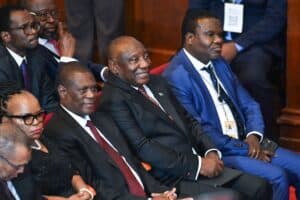On Reconciliation Day, the president has outlined what it will take for the country to truly come together.

In his weekly letter to the nation, President Cyril Ramaphosa reflected on Monday being the Day of Reconciliation in South Africa, which he said marked “two events in our history that are enduring symbols of conflict and resistance”.
The one was “the epic battle of 1838 on the banks of the Ncome River”, and the other was the founding of Umkhonto weSizwe on the same day more than a century later.
“These two historical events are of deep significance; and now symbolic of our ability to transcend a bitter legacy and forge a new path,” he added.
He said the country had much to be proud of in its efforts to unite and heal past divisions, pointing to the joy when the Springboks won the Rugby World Cup in Japan and when Miss South Africa Zozibini Tunzi was crowned Miss Universe.
“South Africans of all races took to the streets in an outpouring of national pride.
“We see it elsewhere every day. In our sport that is now desegregated, in our Parliament, in our transformed places of higher learning and our schools, and on our television screens where programming reflects the diversity of our nation and its languages and cultures.
“Racism and bigotry no longer define our nation. Where they do occur, they are isolated. Where there have been manifestations of intolerance, we have been able to unite behind the values of tolerance and respect for diversity that define our Bill of Rights.”
However, he said there was still a long way to go, since the SA Reconciliation Barometer Survey 2019, published by the Institute for Justice and Reconciliation, had earlier reported that the majority of South Africans felt the country still needed reconciliation.
“At the same time, just over a half of respondents believe that South Africa has made progress with reconciliation since 1994.”
Describing the findings of the report, the president acknowledged that respondents agreed that “reconciliation is impossible as long as corruption continues, political parties sow division, those who were affected by apartheid continue to be poor, gender-based violence remains, we continue to use racial categories to measure transformation, and racism in our society remains unaddressed”.
Ramaphosa said that this confirmed to him that true reconciliation was not only about social cohesion.
“It is also about political and economic transformation. Since we attained our democracy our people have demonstrated time and again their immense capacity to look beyond superficial differences in the quest to achieve true nationhood, and with it, embrace a fuller humanity.
“This is not to diminish the impact of the past. The South Africa of today still suffers from the effects of centuries of discrimination, dispossession and unequal development.
“As the author William Faulkner famously wrote of the American South: ‘The past is not dead and buried. In fact, it isn’t even past.'”
He said the country should “address the unfinished business of our democratic transition”.
“We must close the festering wound of inequality that exists between our people. We must forge ahead with land reform and social development. We must continue to transform our workplaces and restructure our economy so it benefits all.
“In this sense, reconciliation is a very practical undertaking. It is about the work that needs to be done to unlock investment in our economy, to reduce the cost of doing business and to promote growth. It is about the urgent measures we need to take to ensure a reliable supply of electricity to homes and businesses. It is about ensuring that our scarce water resources are preserved and equally available to all.
“Reconciliation means that we should continue to use the capability of the state to improve the lives of the poor, to have a tax regime that is progressive and public finances that are responsibly managed.
“Reconciliation also requires that we reduce the massive inequalities in access to quality health care through, among other things, the introduction of a National Health Insurance. We need to improve the quality of education in township and rural schools in particular and ensure that there is universal attendance in early childhood development centre.
“We will continue to seek out and forge durable social compacts to attain our vision of a South Africa that has been fundamentally transformed. We must all play our part if we are to bequeath to our children a society that has truly reconciled.”
Ramaphosa quoted Irish Nobel Peace Laureate Mairead Maguire, who said: “It is time to put aside egos, individual and collective, for the sake of the youth.”
He called for a “concerted effort to move forward together, focusing on what unites us instead of what divides”, and for South Africans to reach out to each other on this day, during this Reconciliation Month, and throughout the year.
The president ended by wishing the nation well over the festive season and the new year.
(Edited by Charles Cilliers)
For more news your way, download The Citizen’s app for iOS and Android.






